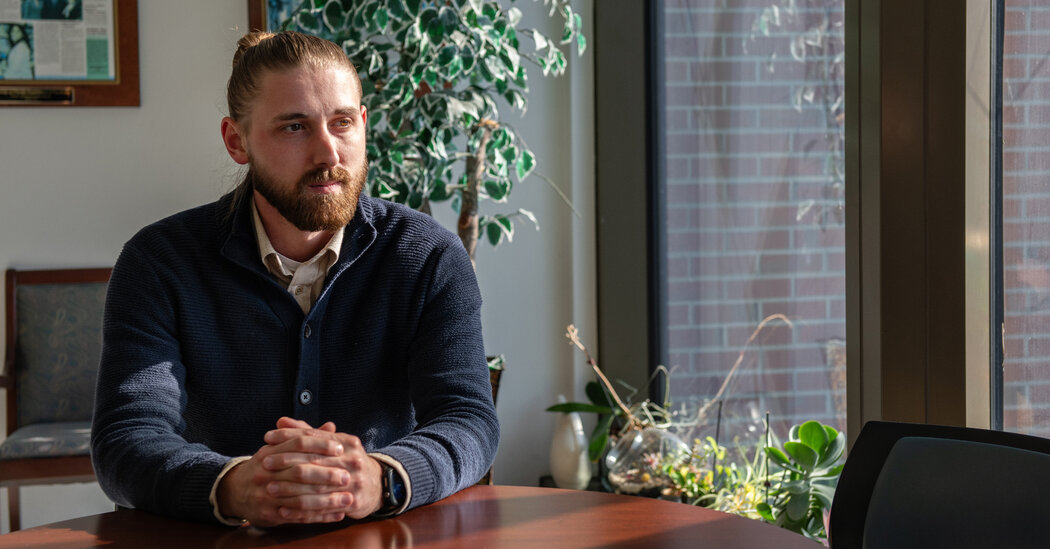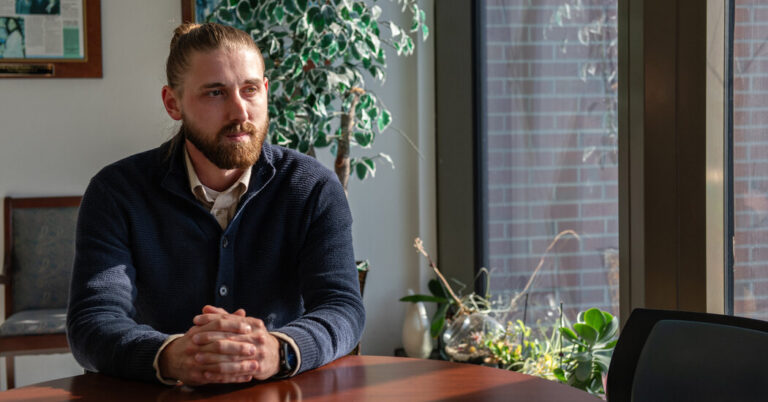Tyler Nelson, post -Deputorate researcher of the University of Florida, studies the neurobiology of pain, a choice partly motivated by his own frustrations with a neuromuscular disability. Last October, he asked the National Institutes of Health for a subsidiary who, if assigned, would have supported his dream of managing his laboratory.
But, in early February, he learned that his question, which took six months to put together, was about to be expelled.
The reason: Dr. Nelson had requested a version of the prize that supports researchers historically under -representative in science, including people with disabilities. That road of financing violates now the executive order of President Trump who prohibits federal agencies from activities relating to diversity, equity, inclusion and accessibility or deia
Dr. Nelson was given upside down by a Nih affiliate, but did not receive any official notice on the situation. “I tried to call 150 times,” he said. Not officially, he learned that the agency was planning to completely attract his presentation rather than moving it to the general premium pool to consider. This happened with at least another type of prize offered by the agency, which did not respond to a request for comment.
Thanks to the suggestion, Dr. Nelson was able to withdraw his question and send again to the general press pool before its expiry, but it is not sure if the others were so lucky.
“What he does is discriminate under -representative people,” said an Nih review who asked to remain anonymous for fear of retaliation. The auditor added that the evaluation criteria for the pools of general prizes and diversity were the same, without priority given to either of the two pools. “I cannot underline enough,” said the auditor, that an unable to grant “will not be financed, whether it is” diversity “or not.”
According to Eve Hill, a lawyer for civil rights in Washington, DC, this can violate some legal protections for people with disabilities, although there are no precedents in court.
“They provided this category to overcome past discrimination,” he said. “Not considering them in the general prize, they are exacerbating this discrimination.”
The situation is one of the many ways in which the accessibility between the sciences is affecting the arrest deia. Federal agencies, once supporters of growing opportunities for disabilities, are ceasing programs oriented towards this goal. On the left is uncertain how funding for disability research – from the design of health services accessible to the construction of better prostheses – will be influenced by the order.
People with disabilities represent more than a quarter of the nation population and are considered the largest minority in the world. But experts say that, until recently, the disability was largely overlooked in discussions on marginalized groups.
“Accessibility has always been seen as a rethinking,” said Kim Knackstedt, disability policy consultant in Washington, DC “, whether intentional or not, disability has been excluded from many efforts of the”.
This extends to the sciences. The National Science Foundation reported that, in 2021, people with disabilities were only 3 percent of the STEM workforce. Only in 2023 did Nih designate people with disabilities as a community who had health disparity.
As the first director of the invalidity policy in the Biden Administration, Dr. Knackstedt led the thrust for accessibility to be at the forefront of the politics of diversity, equity and inclusion. A result of this effort was an executive order issued by President Biden who explicitly appointed accessibility as a area to be strengthened in the federal workforce.
“This was a victory for many of us,” said Bonnielin Swenor, an epidemiologist who founded the Disability Health Research Center at Johns Hopkins University. Dr. Swenor, who has experienced barriers that pursues a research career due to visual compromise, added that it was discouraging “to have those progress not only stop, but rolled back”.
Federal scientific agencies have committed themselves to respecting the inversion, leaving scientists and supporters of the disability apprehensive for the future of research on accessibility. At the beginning of this month, the National Science Foundation began to mark subsidies that contained order words commonly associated with Deia, including “disabilities” and “barrier”.
A director of the NSF program, who asked not to be appointed for fear of retaliation, said that there were “several prizes marked with the word” disability “”, including projects to make the guide and calculation more accessible. The director of the program added that staff members were not sure if these research activities had been prohibited by the executive order.
An NSF spokesman did not answer the questions sent by the New York Times regarding the admissibility of these prizes.
Robert Gregg, engineer of the University of Michigan who designs wearable robots for people with disabilities of mobility, said he had received notification from the NSF to stop Deia’s activities. But he interpreted this to signify additional programs aimed at increasing the participation of groups underneathing science.
“Fundamental research on technology, such as robotics and artificial intelligence – my understanding is that this is still perfectly valid and can continue,” he said. But Dr. Gregg also performs clinical studies financed by NiH and recently learned that the renewal process for this funding had actually been frozen.
Scientists with disabilities are also worried about what the terminal on accessibility will mean both for their careers and for those of the next generation.
“Disabled people were barely included,” said Alyssa Parella, a student graduated from Baylor College of Medicine who founded an online movement called #disabledism. “Now there is a great fear of what will be the future of all of us.”
A notice has been removed on the NiH website that encourages the participation of people with disabilities in the research company, as well as a web page NSF that has listed the financing opportunities for disabilities. Last month, the NSF also postponed an engineering seminar to an indefinite period to better include people with autism and other neurocognitive differences in the workforce.
In geosciences, many graduation programs require students to complete the outdoor field fields of weeks that can be difficult to navigate with certain disabilities. This brought Anita Marshall, professor at the University of Florida, to found Geospace, a field financed by the NSF that incorporates modern technology and can be completed virtually.
He did not know if the Geospace would be able to continue. “This really threw me away,” said dr. Marshall, who described the project as his pride and joy. “I’m not sure what there is next.”
Doubts have also arisen for Dr. Nelson. Although he managed to save his application for Nih funding, the change has rejected any clarity on his future in the search for at least five months.
“It’s a really sad moment in science for trainees,” he said. “I look over the past 15 years, like” why I have worked this underpaid and high stress work? “I want to do it forever?”





